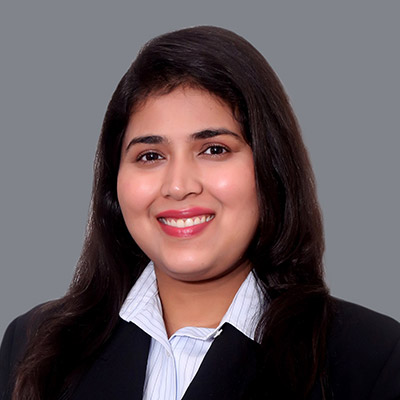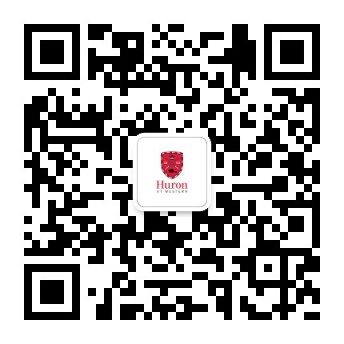The Centre for Islamic Theology, Ethics & Spirituality (CITES) at Huron University coordinates Islamic Studies at the Bachelor of Arts (BA) and Master of Theological Studies (MTS) levels within the Faculty of Theology as well as interdisciplinary programs with the Faculty of Arts and Social Sciences (FASS) and across campus; to organize public and academic programming that explores current topics in Islamic theology and ethics; to support spiritual care for students; and to facilitate dialogue and learning among Muslims and other faith and spiritual communities.
News & Events
The Centre for Islamic Theology, Ethics & Spirituality (CITES) and the Center for Islam in the Contemporary World (CICW) announce
Zakat: Implementation & Impact in the Contemporary World
An International Conference
February 21-22, 2025 | Online & In-Person
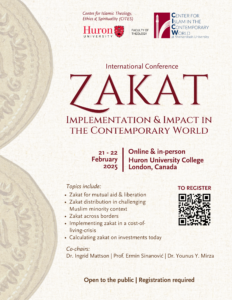
Islamic Studies and Spiritual Care & Chaplaincy at Huron University
Bachelor of Arts, Major & Minor in Religion & Theology
Gain critical knowledge and skills for understanding the way religious and theological issues have evolved and continue to influence contemporary life and culture, in a context that encourages discussion, reflection, and research. Even if you’re not religious, studying religion can help you understand the complex world we live in.
Religious beliefs and practices can have a huge impact on how individuals and groups make social, economic, and political decisions, and it’s important for Leaders with Heart to understand these complex issues to make well-informed, compassionate, and effective decisions.
Students wishing to focus on Quranic Studies, Islamic Theology and Ethics, and other topics in the academic study of Islam, can use courses in these areas as elective credits toward either a Major or Minor in Religion & Theology.
Master of Theological Studies (MTS)
Our Master of Theological Studies program will prepare you for theological engagement and leadership in a variety of settings and can also provide a good foundation for further study in the field of Theology and Islamic Studies. You will develop a solid scholarly grounding in the core theological disciplines, as well as knowledge and skills within a particular practical or academic concentration, including Spiritual Care & Chaplaincy for Muslim Communities. Students of all faith traditions are welcome in this program.
Our MTS is a two-year, post-baccalaureate, professional undergraduate degree that may be taken full-time or part-time. The degree is granted by Western University and accredited by the Association of Theological Schools.
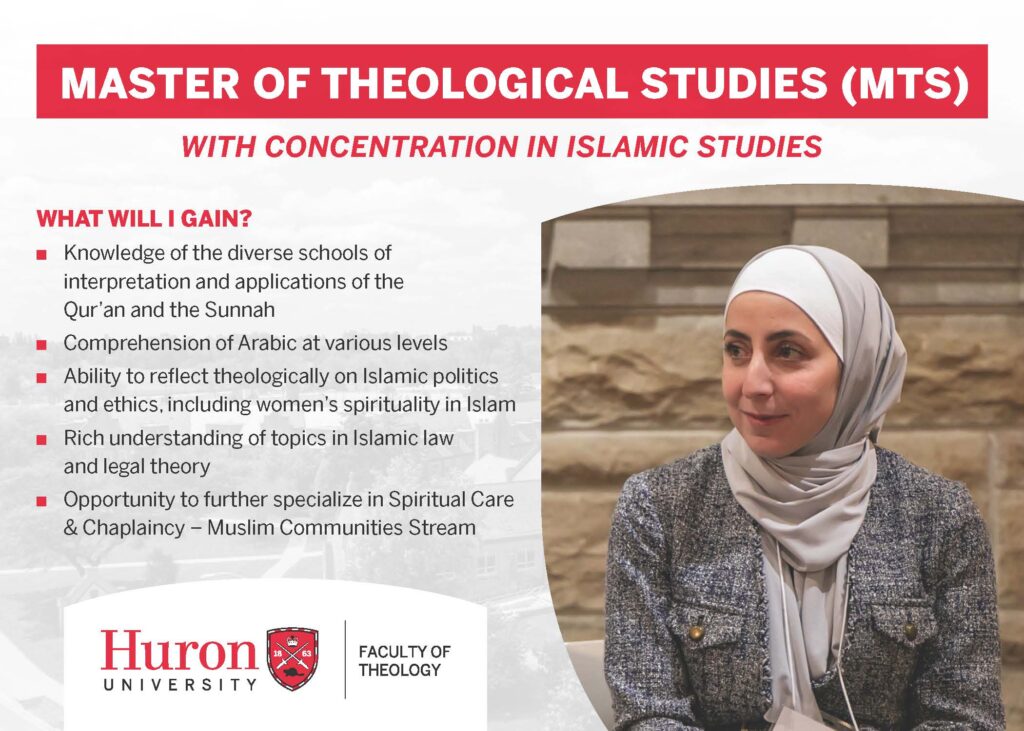
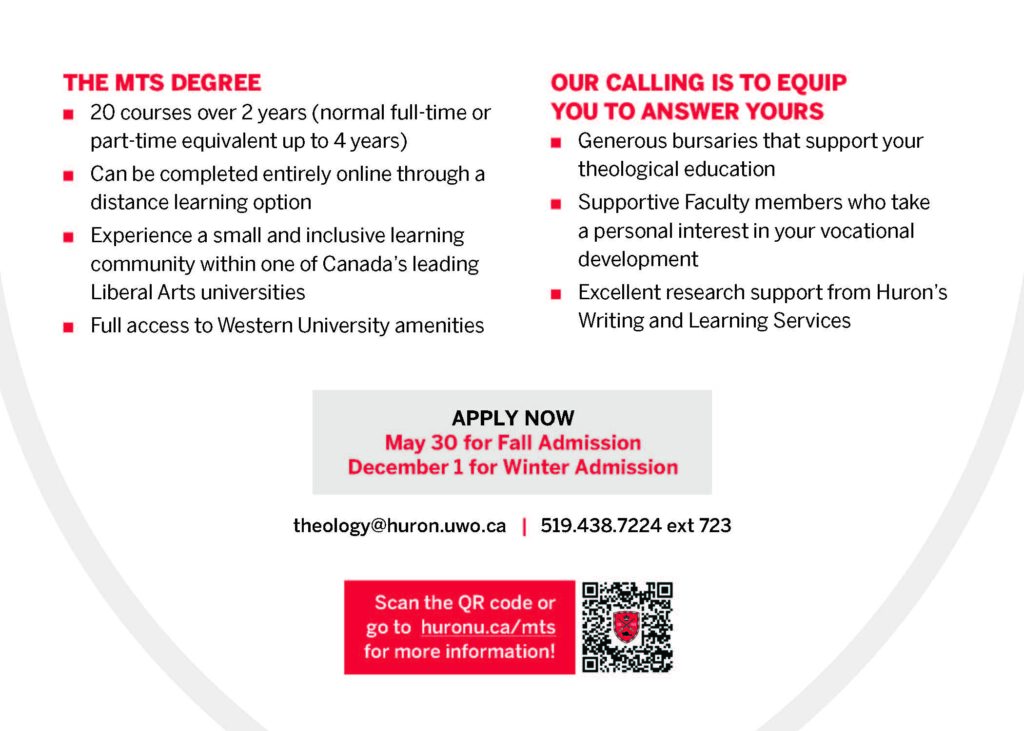
Complete all 20 half-courses (10.0 full courses) in the degree from the areas and electives as indicated below:
- Area I: Scriptural Studies (2.0 courses)
Either
Religious Studies 5310A/B: Interpreting the Qur’an
Or
Biblical Studies 5320A/B: New Scholarship in Qur’anic Studies
And
Biblical Studies 5119A/B: Studies in Sunnah and Hadith
Plus one half-course in Qur’anic Arabic
Plus one further half-course from Area I, Scriptural Studies, including any Qur’anic Arabic course - Area II: Theological Studies (1.5 courses)
Systematic Theology 5208A/B: Key Issues in Islamic Theology
Theological Ethics 5213A/B: Islamic Ethics: Theory and Application
Plus one half-course from Area II, Theological Studies - Area III: Historical Studies (1.0 course)
Church History 5111A/B: History of Christian-Muslim Relations
One further half-course from Area III, Historical Studies - Area IV: Public Leadership & Ministry Studies (0.5 courses)
One half-course from Area IV, Public Leadership & Ministry Studies - Area V: Contextual & Formational Studies (1.0 course)
Field Education 5110A: Identity and Formation
Pastoral Theology 5213A/B: MTS Integration and Formation Seminar - Area VI: Comparative & Cultural Studies (0.5 courses)
Religious Studies 5134A/B: Navigating Freedom of Religion and Accommodation in Canadian Society - General Electives (3.5 courses)
Seven half-course electives from any of the areas - Multireligious Engagement Requirement
At least one half-course (from any area or from among electives) must focus on a religious tradition other than the tradition primarily studied in the degree program.
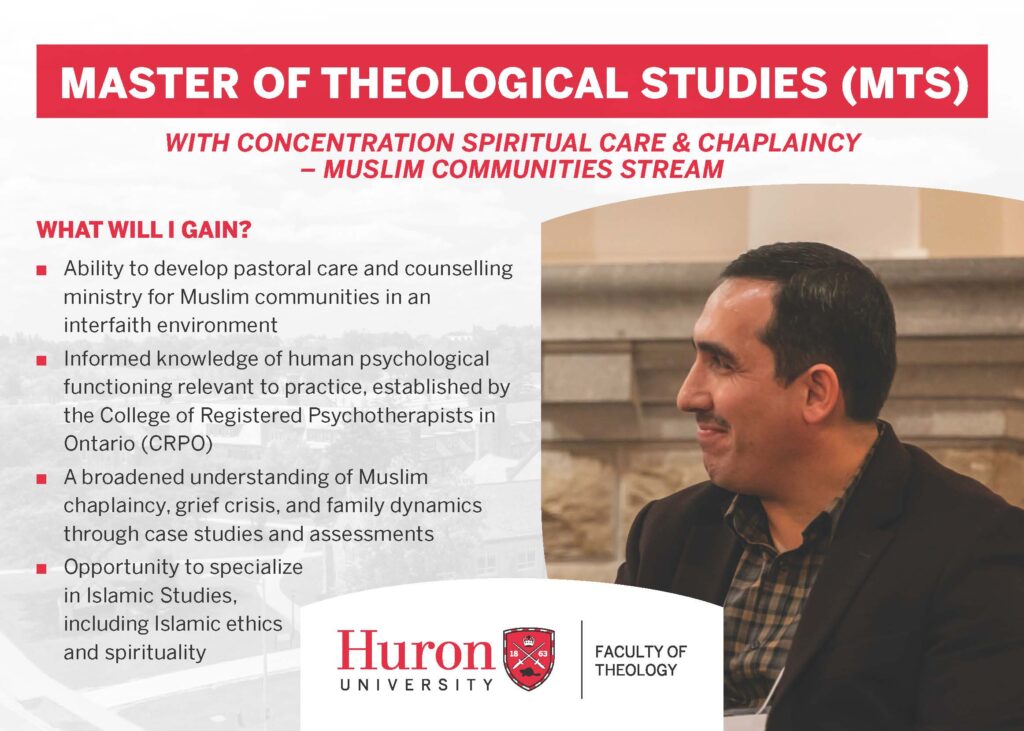
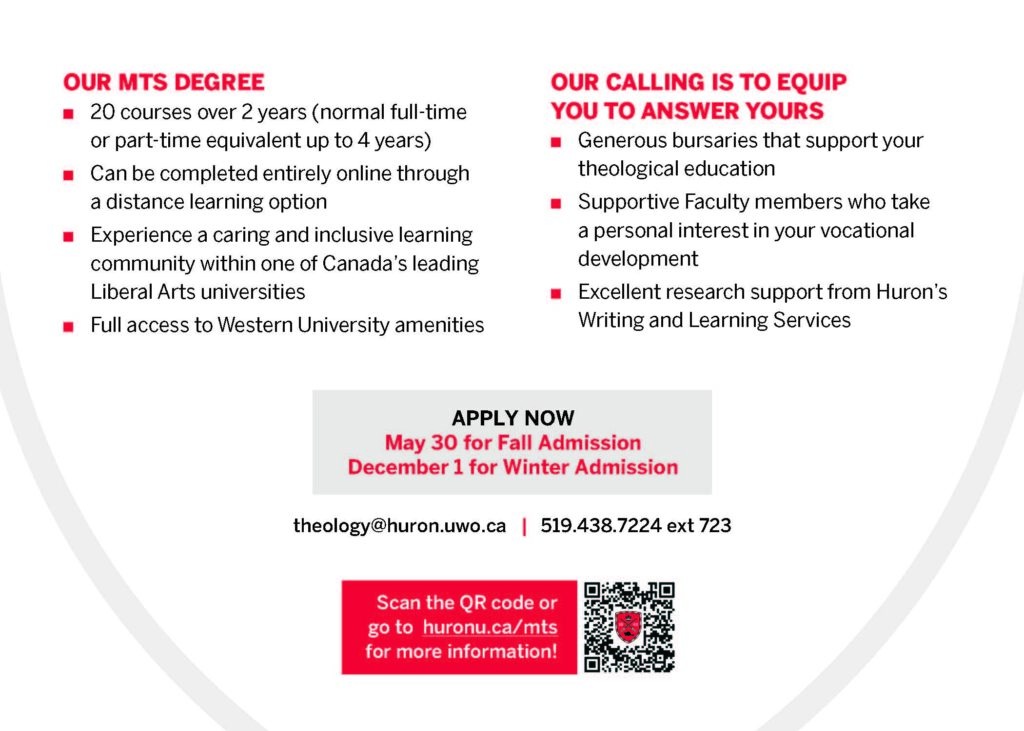
Complete all 20 half-courses (10.0 full courses) in the degree from the areas and electives as indicated below:
- Area I: Scriptural Studies (1.5 courses)
Either
Religious Studies 5310A/B: Interpreting the Qur’an
Or
Biblical Studies 5320A/B: New Scholarship in Qur’anic Studies
And
Biblical Studies 5119A/B: Studies in Sunnah and Hadith
Plus one further half-course from Area I, Scriptural Studies, including any Qur’anic Arabic course - Area II: Theological Studies (1.5 courses)
Systematic Theology 5208A/B: Key Issues in Islamic Theology
Theological Ethics 5213A/B: Islamic Ethics: Theory and Application
Plus one from:
Religious Studies 5202A/B: Spirituality of Muslim Women
Any others from Area II, Theological Studies - Area III: Historical Studies (1.0 course)
Church History 5231A/B: Independent Study: History of Spiritual Care
One further half-course from Area III, Historical Studies - Area IV: Public Leadership & Ministry Studies (3.5 courses)
- Foundations for Spiritually Integrated Psychotherapy Practice
Pastoral Theology 5231A/B: Pastoral Care and Counseling Ministry - Human Development & Theories of Growth
Pastoral Theology 5250A/B: Human Development & Growth Process - Professional Ethics
Pastoral Theology 5298A/B: Case Studies in Chaplaincy and Professional Ethics - Spiritual Distress and Assessment
Pastoral Theology 5255A/B: Spiritual Care Assessment and Planning - Theories of Psychotherapeutic Practice (Choose THREE of four)
Pastoral Theology 5232A/B: Pastoral and Spiritual Care in Muslim Community Contexts
Pastoral Theology 5330A/B: Couple and Family Dynamics
Pastoral Theology 5332A/B: Family of Origin Seminar
Pastoral Theology 5334A/B: Grief, Crisis, and Pastoral Care - Area V: Contextual & Formational Studies (2.0 course)
Field Education 5110A: Identity and Formation
Supervised Practical Education 5120: SPE Basic I
Pastoral Theology 5213A/B: MTS Integration and Formation Seminar - Area VI: Comparative & Cultural Studies (0.5 courses)
Religious Studies 5134A/B: Navigating Freedom of Religion and Accommodation in Canadian Society - Multireligious Engagement Requirement
At least one half-course (from any area or from among electives) must focus on a religious tradition other than the tradition primarily studied in the degree program.
Current Student and Alumni Stories
Professors
Contact Us
–





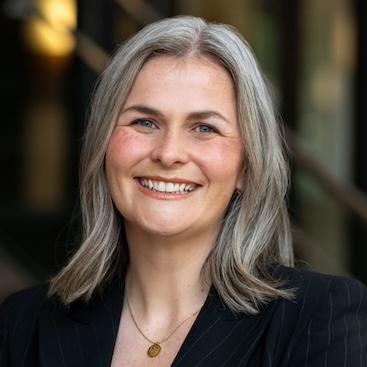
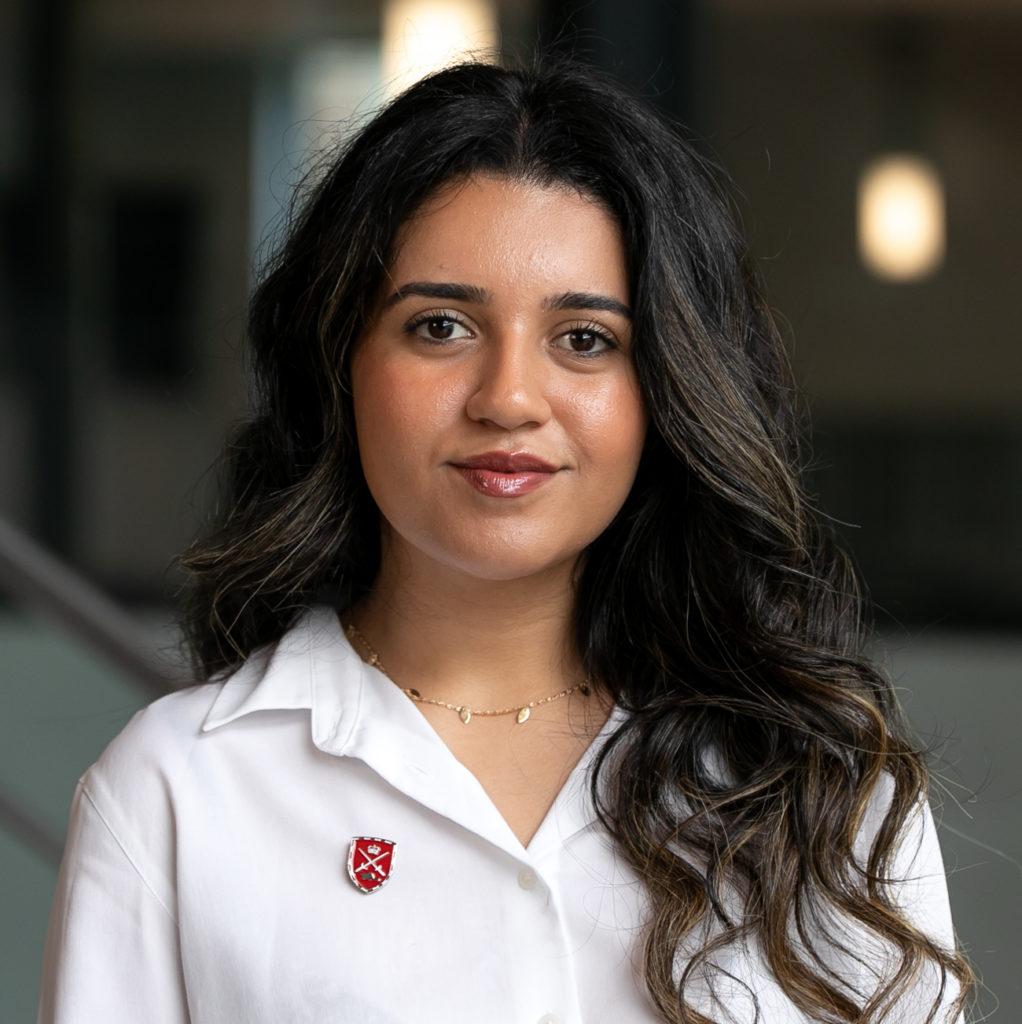
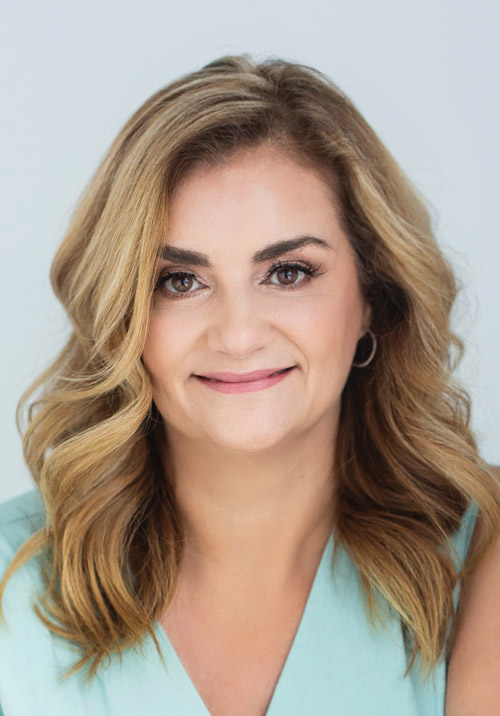 Lisa Jones Keenan is the Vice President of Sales at Xplornet Communications, the largest rural fixed wireless broadband service provider in Canada.
Lisa Jones Keenan is the Vice President of Sales at Xplornet Communications, the largest rural fixed wireless broadband service provider in Canada. 
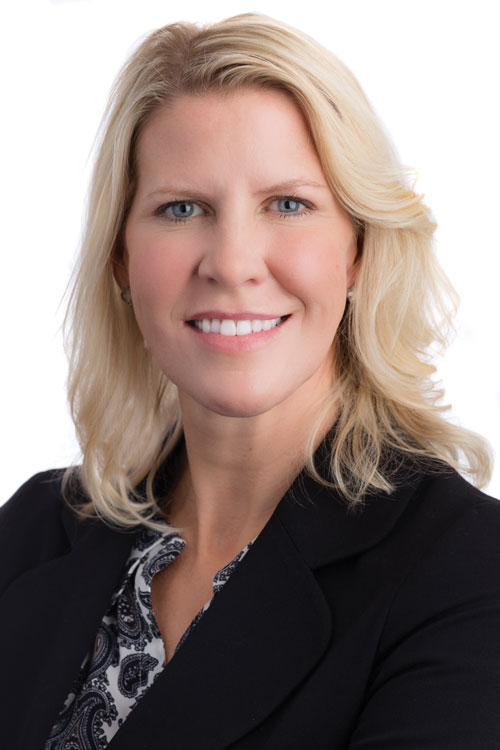 Leigh Allen is the AVP, Global Strategic Research, Reinsurance Group of America Inc., one of the world’s largest global life and reinsurance companies.
Leigh Allen is the AVP, Global Strategic Research, Reinsurance Group of America Inc., one of the world’s largest global life and reinsurance companies.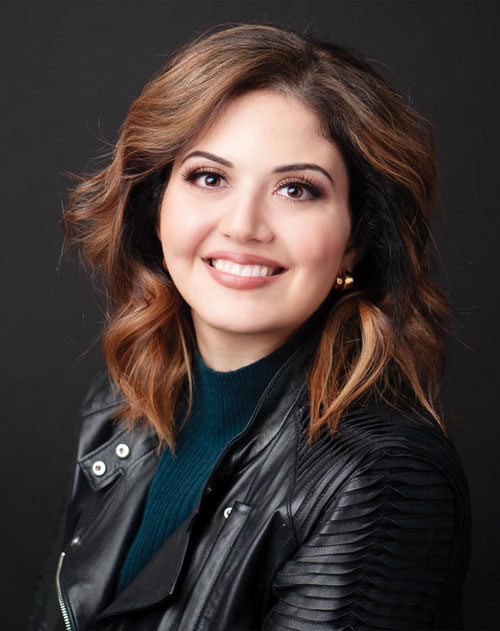 Yola Ventresca is a Managing Partner, Lerners LLP, Secretary of Huron’s Board of Governors and a Huron Class of ’02 alumni. Selected as one of Canada’s “Best Lawyers,” she is passionate about the value of Liberal Arts in helping students succeed in their careers.
Yola Ventresca is a Managing Partner, Lerners LLP, Secretary of Huron’s Board of Governors and a Huron Class of ’02 alumni. Selected as one of Canada’s “Best Lawyers,” she is passionate about the value of Liberal Arts in helping students succeed in their careers.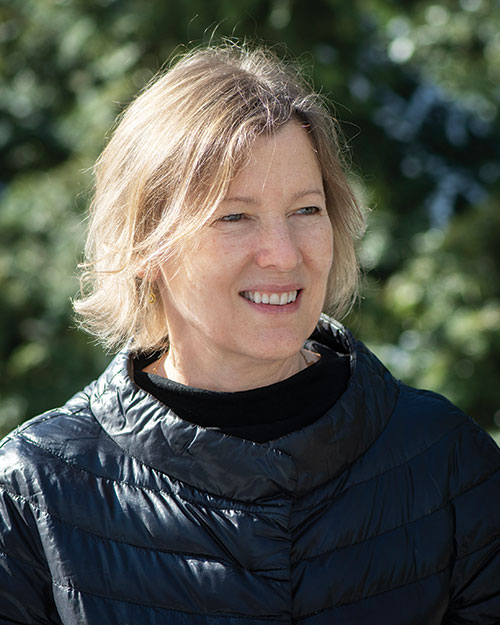 Susan Farrow is an Assistant Professor in The Temerty Faculty of Medicine at the University of Toronto and a Founding Partner and Co-Director of The Toronto Institute of Group Studies, an organization offering certified training and education in group leadership.
Susan Farrow is an Assistant Professor in The Temerty Faculty of Medicine at the University of Toronto and a Founding Partner and Co-Director of The Toronto Institute of Group Studies, an organization offering certified training and education in group leadership. 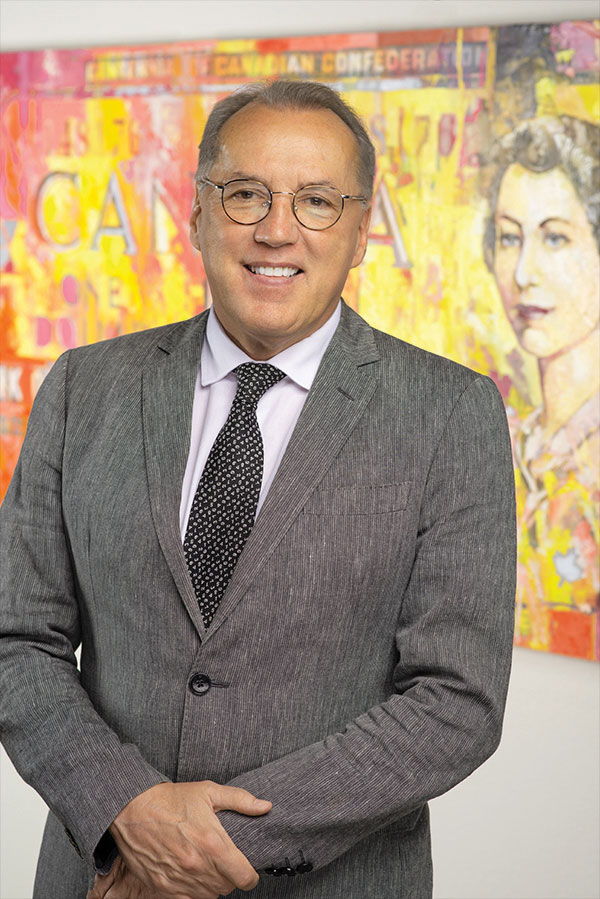 Frank Holmes is CEO and Chief Investment Officer of U.S. Global Investors, as well as a business commentator, philanthropist and Huron Class of ‘78 alumnus. Holmes also serves as the Executive Chairman of HIVE Blockchain Technologies, the first cryptocurrency mining company to go public in 2017.
Frank Holmes is CEO and Chief Investment Officer of U.S. Global Investors, as well as a business commentator, philanthropist and Huron Class of ‘78 alumnus. Holmes also serves as the Executive Chairman of HIVE Blockchain Technologies, the first cryptocurrency mining company to go public in 2017.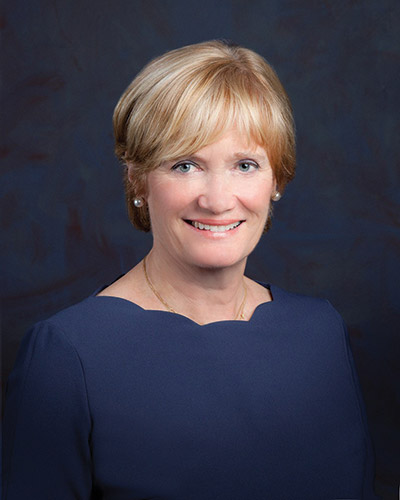 Kelly Meighen is an experienced philanthropist and volunteer. In her role as president of the T.R. Meighen Family Foundation, she has created a legacy of volunteerism and philanthropic giving in the areas of youth mental health advocacy, environmental conservation and cultural vibrancy.
Kelly Meighen is an experienced philanthropist and volunteer. In her role as president of the T.R. Meighen Family Foundation, she has created a legacy of volunteerism and philanthropic giving in the areas of youth mental health advocacy, environmental conservation and cultural vibrancy. 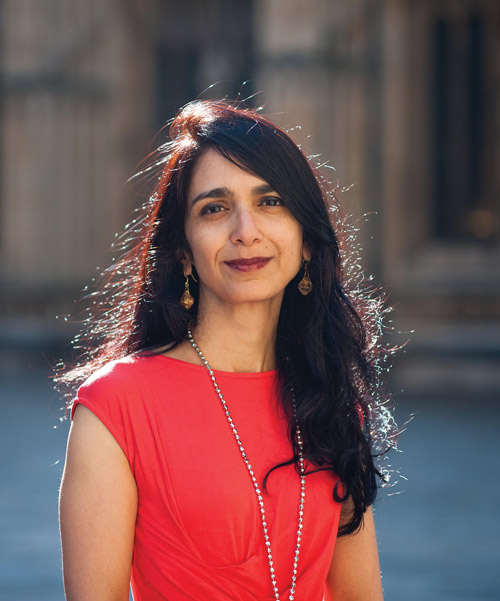 Ranjita is Executive Chair of the Oxford Global Partnership, advising investors, businesses, family offices and entrepreneurs on sustainable, inclusive and responsible value creation. A Business Fellow at Oxford University’s Smith School, Ranjita engages with companies on pursuing value with values, and teaches a postgraduate “Essentials of ESG & DEI” course.
Ranjita is Executive Chair of the Oxford Global Partnership, advising investors, businesses, family offices and entrepreneurs on sustainable, inclusive and responsible value creation. A Business Fellow at Oxford University’s Smith School, Ranjita engages with companies on pursuing value with values, and teaches a postgraduate “Essentials of ESG & DEI” course.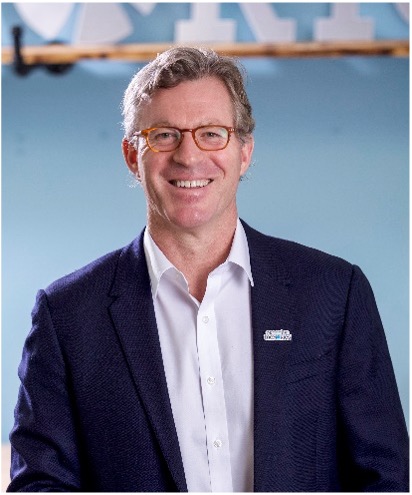 Caleb Hayhoe is the Founder & Chairman of Flowerdale Group and a Huron Class of ’85 Alumnus. Flowerdale Group is a Hong Kong based family office with a global investment outlook across public markets, real estate and private investment. Hayhoe previously spent over ten years building a global sourcing business together with an exceptional team, and remains committed to entrepreneurialism and helping great ideas become sustainable companies.
Caleb Hayhoe is the Founder & Chairman of Flowerdale Group and a Huron Class of ’85 Alumnus. Flowerdale Group is a Hong Kong based family office with a global investment outlook across public markets, real estate and private investment. Hayhoe previously spent over ten years building a global sourcing business together with an exceptional team, and remains committed to entrepreneurialism and helping great ideas become sustainable companies.
